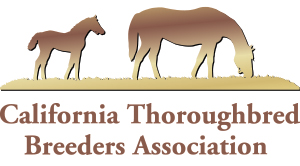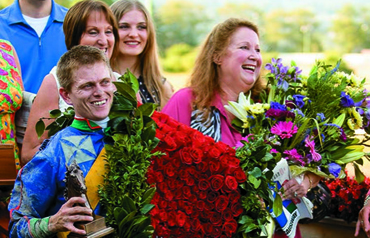By California Thoroughbred
Rozamund Barclay can remember every horse she has ever bred, owned, or even worked with, and she has a certain level of affection for all of them.
“I can honestly say I am fond of all the equines I have had the pleasure of raising, owning, purchasing, or caring for,” Barclay said, adding, “Obviously, some take up a bit more room than others in my heart.”
Her list is lengthy, populated by horses such as North Pacific, Hi Fashioned, Estellara, Slew’s Charm, Commandress, Stay Positive, and Hot Gem. Her graded stakes-winning stallion Northern Causeway sits right at the top. His first foals will debut on the track this year.
Barclay grew up in Portola Valley, Calif., where she first took riding lessons as a 6-yearold on a retired racehorse. Her family moved to Vashon Island in Washington, where she continued her equine schooling with vaulting, eventing, Western pleasure, and games. By the time she was 14, Barclay was teaching lessons and helping to break horses.
“Pony Club and my mother were great influences in the importance of being educated and a good ‘horseman,’ ” she said. “I always felt guilty being paid to ride and work with horses after school and on weekends. I grew up riding on beautiful evergreen trails and beaches.”
Barclay credits Carl and Karen Olson for her introduction to the racing business. She was babysitting their children and teaching them to ride when Carl asked Barclay to work with some Thoroughbreds he raised. When Barclay turned 17, he got her a job working at Longacres.
“The rest is history,” Barclay said. “I was in love with the racetrack, the majestic Thoroughbreds, and the idea that I could get paid to groom, gallop, and paddock horses.”
Although Barclay meant to arrange her work at the track around her college classes, she admits that “inevitably, the reverse happened.” She got her trainer’s license at 21, training out of Longacres until it closed in 1992. Now she is a breeder, owner, and aftercare advocate.
“I seriously try not to count the number of horses I have,” she said.
She keeps retirees at her home in Washington and her broodmares and Northern Causeway at Rancho San Miguel in California. Northern Causeway was a $47,000 RNA at the 2010 Barretts May 2-year-old sale. Barclay purchased him privately, and the son of Giant’s Causeway—Getaway Girl, by Silver Deputy, rewarded her by breaking his maiden in his sophomore bow. He went on to win a pair of stakes at Hastings Racecourse, including the 2011 British Columbia Derby (G3). He won five of 30 starts, with four seconds and four thirds, for earnings of $265,367.
“Northern Causeway’s success has been a huge inspiration to be involved in breeding and racing,” Barclay said. “Every time I get to see him, spend time with him, feed him an orange, and see his offspring, it makes me feel inspired and I appreciate the privilege of having horses.”
So far, he is proving himself worthy of her attention. “I am a big believer in bloodlines, which is why I am so hopeful for Northern Causeway. His foals so far are remarkably correct and well-conformed out of a variety of mares. The first 2-year-olds are starting well. With a little racing luck and lots of hopes and prayers, success is a possible future.”
Other horses that have made a mark for Barclay include stakes winners Estellara and Hi Fashioned, and stakes-placed North Pacific and Slew’s Charm. She owns and bred multiple stakes-placed winner Algenon, and she bred Hot Gem, a California-bred who has gone on to finish second in the Jan. 7 Ladies Overnight Handicap at Portland Meadows for Jonathan Nance, Barbara Eakin, and Randy Evers.
Another equine dear to Barclay’s heart is Rising Cari, a Cal-bred son of Cari Country owned and trained by Mike and Patricia Harrington. The chestnut horse won 16 of 68 starts from 1988-94.
“They gave me the job of caring for him at my place in Washington during his senior years,” Barclay said. “He won so many races for them, so they provided retirement for him. He lived a long and healthy life, like a grandparent. At home we all felt that he enriched our lives and stole our hearts.”
She feels that there is “something about old horses,” noting, “I have been privileged to care for my own and other people’s. They always find a way to give back, by tolerating our children, green farm help, and the yearlings they teach manners to.” Although Barclay admits she “doesn’t have the answers,” she is concerned about the longevity of horse racing on the West Coast.
“I am worried, as are all breeders and owners, with the growing concerns of the business of breeding and racing horses. We as an industry employ such a variety of people and support other agricultural industries and economic stimulus. I feel our business model is broken despite heroic efforts being made to revive it.”
That said, she has “gratitude for people in the California Thoroughbred Breeders Association, the Thoroughbred Owners of California, and other horseman’s associations that are working, many at their own cost, to find resolutions. My hope is that we can make the industry attractive to new owners and fans and educate our legislators to the benefits of promoting the health of our industry.”
Worries aside, Barclay is upbeat and passionate about the game.
“It is difficult to explain that I remember all of the horses in my life, from the first ones I rode, later groomed, trained, worked on for veterinarians, owned for racing, or now breeding,” she said. “Sometimes it is embarrassing because I don’t remember a person’s name or their children’s names, but I remember a horse they owned. I think many of those affected with this addiction to horses are the same.”
She also had words of appreciation for Rancho San Miguel.
“I feel blessed that they took on Northern Causeway and my mares,” she said. “Their entire crew is passionate and dedicated to the best care they can provide. A college professor who frequented the racetrack once pointed out to me that if the prey was not fragile, the predators would go hungry, so without good caretakers, success is near impossible. “Horses in all sports are a humbling experience,” she added. “Every time you think you really know something, they have a way of putting you in your place. A person has to be an optimist and have stubborn perseverance for all who help in this industry. I have the above; let’s hope I have some more fast horses, too.”


